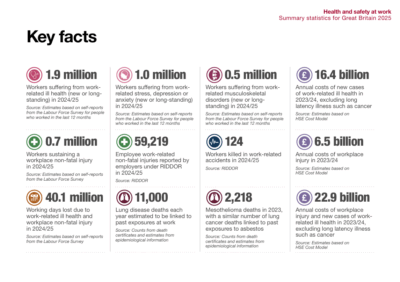Key figures from the Health and safety at work Summary statistics for Great Britain 2025An estimated 1.9 million workers suffered from work-related ill health (new or long-standing).
- Of those, 964,000 reported stress, depression or anxiety caused or made worse by work.
- 511,000 workers suffered a work-related musculoskeletal disorder (MSD).
- There were 124 work-related fatalities.
- An estimated 680,000 workers sustained a non-fatal injury
- According to employer reports under RIDDOR, there were 59,219 injuries.
- Work-related ill health and injuries led to an estimated 40.1 million working days lost in 2024/25.
- The estimated cost of workplace injuries and new ill-health cases (from the most recent rolling-average cost model) remains at £22.9 billion (for 2023/24 as the reference year).

2023/24 Snapshot for Comparison
From the HSE 2023/24 statistics:
- 1.7 million workers reported work-related ill health.
- 776,000 of those related to stress, depression or anxiety.
- 543,000 suffered from work-related musculoskeletal disorders.
- 138 workers were killed in work-related accidents (note: this figure was provisional at the time of reporting).
- 604,000 workers reported a non-fatal injury.
- 33.7 million working days were lost due to work-related ill health or injury in 2023/24.
Year-on-Year Comparison & Emerging Patterns
| Metric | 2023/24 | 2024/25 | Change / Observation |
| Total workers with work-related ill health | 1.7m | 1.9m | ↑ 200,000 – increase, indicating a rise in reported ill-health |
| Work-related stress/depression/anxiety | 776,000 | 964,000 | ↑ 188,000 – substantial rise in mental health related ill-health |
| Musculoskeletal disorders (MSD) | 543,000 | 511,000 | ↓ 32,000 – slight drop, though MSD remains a major category |
| Fatal work-related injuries | 138 | 124 | ↓ 14 – a small improvement in fatal accidents |
| Non-fatal injuries (self-reported) | 604,000 | 680,000 | ↑ 76,000 – more non-fatal injuries reported |
| Working days lost (ill health & injury) | 33.7m | 40.1m | ↑ 6.4m – significant increase in lost productive time |
What the Verified Data Suggests: Insights & Implications
- The increase in total reported ill health (1.7 m → 1.9 m) suggests that workplace health pressures especially non-fatal but chronic or recurring issues are rising again.
- The sharp jump in mental-health related ill health (stress/depression/anxiety) makes clear that mental wellbeing is a growing, perhaps dominant, driver of work-related ill health. For many employers, mental health risks may now surpass traditional physical risks.
- While musculoskeletal disorders fell slightly, the number remains high (over half a million). That indicates continued risk and signals that sectors reliant on manual work, repetitive tasks, or poor ergonomics must keep MSD prevention high on the agenda.
- Non-fatal injuries increased notably, even as fatalities fell. This may reflect better reporting, or more frequent “everyday” injuries which though less severe, still impact workforce health, morale and productivity.
- The large rise in working days lost (by ~19%) is worrying lost productivity, disrupted operations, increased absenteeism. These all point to real financial and operational burdens for businesses.
- The reduction in fatalities is a positive sign for overall safety culture and regulation but the continuing high numbers of ill health and non-fatal injuries show that “safety” today must mean more than preventing death: it must embrace long-term health, mental wellbeing and chronic risks.
How Can We Help
With the 2024/25 HSE statistics showing rising levels of work related ill health, stress and non fatal injuries, it is more important than ever for organisations to take a proactive and structured approach to health and safety. At HCS Safety, we provide a full spectrum of face to face, classroom based training ranging from Working at Height and Occupational Stress to degree level NEBOSH Diploma programme. Our accredited training through NEBOSH, IOSH, CITB, PASMA, UKATA and NUCO, along with our bespoke courses, ensures that your staff receive guidance that is tailored to your risks and industry.
In addition to training, our Membership Service offers a cost effective way for businesses to access a dedicated safety department. This includes annual reviews, safety policies and ongoing telephone support. With more than 500 membership clients across Hampshire, West Sussex, Dorset, Wiltshire, Surrey and London, we support organisations of every size.
For specialist needs, our consultancy team can assist with workplace inspections, Risk assessments, CDM support, accident investigations, occupational stress assessments and many other areas of safety management. Whatever challenges are highlighted by this year’s HSE data, from rising stress levels to increased injury rates, HCS Safety is ready to help you strengthen compliance, reduce risk and create a safer and healthier workplace.




